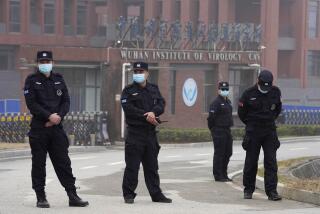Bioterror threat is increasing, study says
WASHINGTON — The threat of biological terrorism is growing, according to a congressionally ordered study that calls for aggressive defenses on par with those used to prevent nuclear terrorism.
Due for release this week, a draft of the study warns that bioterrorists might one day make synthetic versions of killers such as Ebola, or germs genetically modified to resist vaccines and antibiotics.
The bipartisan report says that the Bush administration has devoted insufficient resources to the threat and that U.S. policies have at times impeded international biodefense efforts.
Meanwhile, the U.S. has promoted the proliferation of domestic labs holding the most virulent pathogens, the report says. The number of such “high-containment” labs in the United States has tripled since 2001, yet officials have not implemented adequate safeguards to prevent deadly germs from being stolen or accidentally released, it says.
“The rapid growth in the number of such labs in recent years has created new safety and security risks which must be managed,” the draft report says.
The report is the product of a six-month study by the Commission on the Prevention of Weapons of Mass Destruction and Terrorism, which Congress created in the spring. Drafts of chapters pertaining to bioterrorism were obtained by the Washington Post.
The document cites progress in many areas of biodefense since the deadly anthrax attacks of 2001, including major investments in research, stockpiling of drugs and development of a network of sensors designed to detect airborne viruses and bacteria.
The Bush administration has spent more than $20 billion on such countermeasures, far more than any of its predecessors.
But the report says the next administration must do much more to prevent pathogens from falling into the wrong hands. Though politicians often warn about the dangers of nuclear terrorism, a serious biological attack would be easier to accomplish and deserves high priority as well, it says.
“The more probable threat of bioterrorism should be put on equal footing with the more devastating threat of nuclear terrorism,” the draft says. It calls on the Obama administration to develop a comprehensive approach to preventing bioterrorism and “banish the ‘too-hard-to-do’ mentality that has hobbled previous efforts.”






